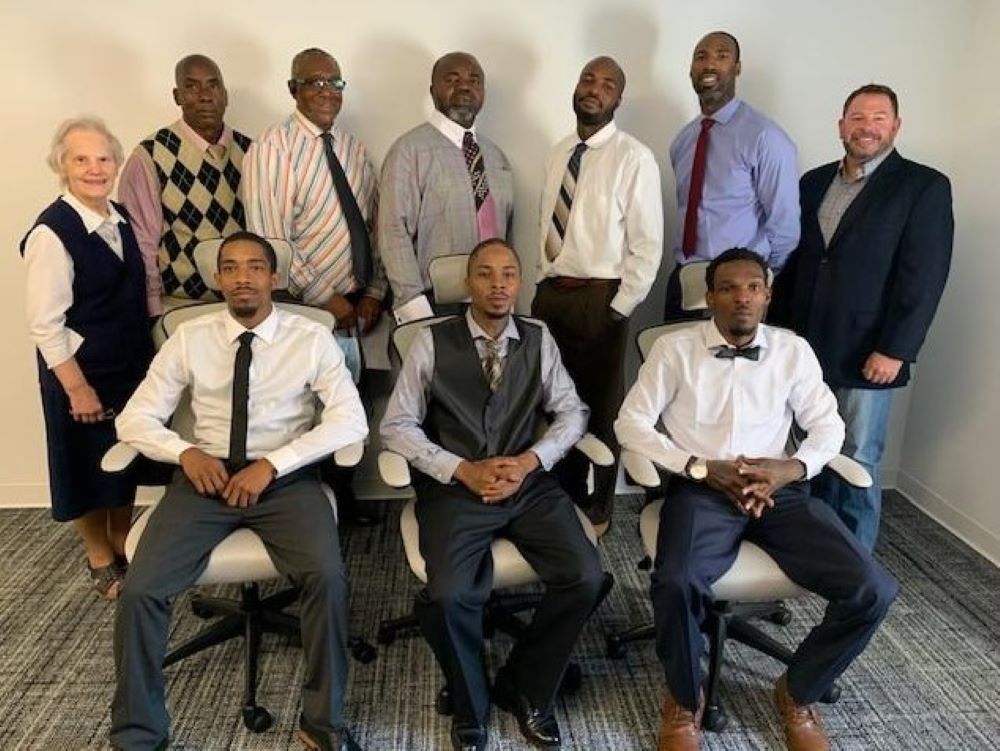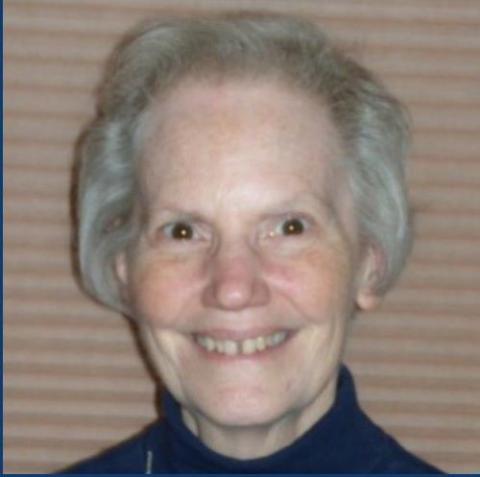
Sr. Carol Schumer, left, stands with Family Formation program facilitators and participants. The program is run by the Fathers & Families Support Center in St. Louis, Missouri, and aims to elevate parenting styles among fathers who have or are seeking partial custody or visitation with their children. (Courtesy of Fathers & Families Support Center)
Born in Perryville, Missouri, a rural Catholic community, Sr. Carol Schumer was one of nine siblings growing up. In 1966, she entered the Daughters of Charity, which maintains a provincial office in St. Louis and an international office in Paris.
Educating others has been a continuous theme in her life. A bachelor's degree in mathematics and a master's in private school administration supported her 28 years as an educator of youth — first in the classroom and then as a principal. Then they saw her through more than two decades as a parenting specialist with the Fathers & Families Support Center in St. Louis. She retired in December.
"I always say I’m an educator by profession," she told Global Sisters Report. "It's in me!"
Her work through the service agency’s Family Formation program has allowed her to reach parents — mostly fathers — who seek a better relationship with their children. Although Schumer's time in the classroom has ended, her attempts to reach others continue: Her reflections are regularly broadcast on "The God Minute" podcast.

Sr. Carol Schumer retired in December after two decades as a parenting specialist with the Fathers & Families Support Center in St. Louis. (Courtesy of Fathers & Families Support Center)
GSR: Tell me about the Family Formation program.
Schumer: It’s a six-week program, five days a week. The rules and regulations are pretty strict. The guys have to be here, and they have to be on time. We have facilitators who have been there, done that. They say, "I've done it, I know you can do it too." And they share their stories too, which is helpful.
I do the parenting segment. It's just one day a week, and it's for two-and-a-half hours, and I've been doing that for 24 years — 146 of the 149 classes.
Is there a specific referral process for participants?
Actually, no. We advertise on the radio, we advertise in newspapers, we do billboards and we advertise at bus stops. The program runs every two months, so the first six weeks are the actual program, and the last two weeks are the recruitment time.
The best recruitment is the word of mouth by the guys who participate. Sometimes, the men are mandated or pushed by their mom, a significant other or somebody else.
Sometimes, we have to encourage them to leave because they aren't ready. The original program was prepared for men in their 20s, but most of the guys don't reach the bottom by that time.
We also test them in the first week for drugs, and if they have any drugs in their system, they have to do AA or NA meetings.
If they tested positive at the beginning, we test them again at the end, and they don't graduate if they're still addicted because we're recommending them for employment, and we can't recommend guys that we can't support. Many of our guys have felonies, and because we have such good relationships with businesses, they're willing to give them a chance because we back them.
How has your approach evolved since your initial involvement with the program?
I facilitate a curriculum called Strengthening Families. It's a very health-oriented program.
Over the years, I've realized how important stories are, and especially, being honest and vulnerable about myself and my own experiences because that frees the guys — not so they'll take care of me, but so they'll be free to address their issues and baggage.
I’ve found laughter is really one of the best ways to get people to open up and to look at serious things, so I use good cartoons like 'Family Circus," "Rose Is Rose." "Baby Blues" or "Curtis."
Does the program serve only men?
No, we also serve women who are mothers. They may be 1% or 2% of those we serve, but in the past, we've had fathers and the children's mothers take the Family Formation Program in tandem. It's not regular, but it has happened. Both parents are not together, but they want to co-parent successfully.
What is the content of the program like, and how do you work to reach participants of different ethnicities and backgrounds?
In the first class, my whole goal is to let them know I'm on their side. They can trust me, and they're safe. I start by saying, "I'm white, I'm a woman, I have no children, so I have three strikes before I start." I ask the men how they feel about this situation because these feelings can block all kinds of input. One of the guys said, "You're old, besides!”
They've been told that they're deadbeats and have no value. I really encourage them to see that they might be dead broke, but they're not deadbeat, and their children need their daddies. I say, "Don't ever not go see your child because you don't have anything to give them. You have yourself to give them, and that's the most important thing."
That is one of my primary goals — to let them know that it's their presence in their child's life. They need to know them emotionally and that dads do things differently than moms.
I use cartoons where dads tease their children because teasing is another one of the ways that dads do great things. Curtis' father in "Curtis" is wonderful at that. He does a great job at that.
I do a lot of discipline because the only discipline we know is how we were disciplined. Most of these guys were disciplined physically. I try to help them see that there are other techniques you can use that are much more helpful for the child in learning to be respectful. We change the definition of discipline from punishment, suffering and fear to learning the easiest way to do what's respectful behavior. We start by modeling — you have to model what you want your child to do. Since most of these men have not had fathers, our facilitators are their role models.
How does it feel to see these guys come back multiple times and form bonds with the other participants?
It's wonderful. One of the most encouraging things to me is that when I'm in a restaurant, one of the guys will be willing to recognize me.
There are three statistics that really touch my heart: 91% of the participants demonstrate positive parenting skills, and 92% report increased interaction with their children. It's all about helping the children realize that dad's there for them. Also, 90% gain knowledge about how to develop positive relationships, not only with their children but also with the mother of their children, which is so key. People think these guys don't care about their children. They love their children. They are in pain when they can't see their children.
Advertisement
Do most of the men you work with have at least partial custody of their children?
Most of them are really striving sometimes even to get visitation rights. Some of them have their children and are struggling with dealing with them, but most of the time, they don’t. Many want custody, especially if they're in the Division of Family Services care.
I start by telling the men the four things that regularly happen when people participate in the program. The first one is their confidence increases because they've gotten more information. They know how to deal with their children.
The second one is, "The only behavior I can change is me." They begin to change their behavior, and that ripples out to their children.
The third one is — and this is the hardest — they begin to name the baggage and issues they have from childhood and change them because if they don't change them, they pass them right on to their children.
The fourth one is they don't have to do it by themselves. They have all the other men in that class, plus all the staff and fathers and families support centers. It's not an easy program, and to finish, they take a graduation certificate to court. It carries a lot of weight because the court really respects the program.







